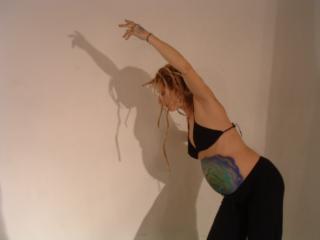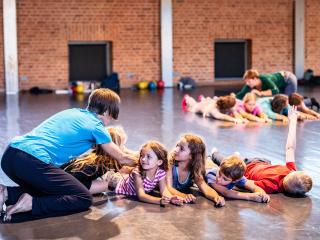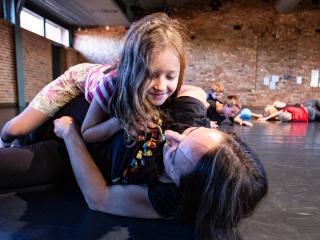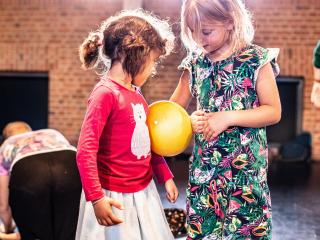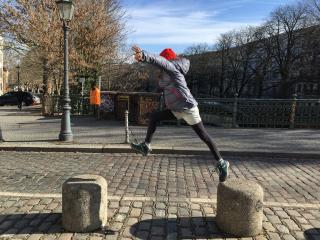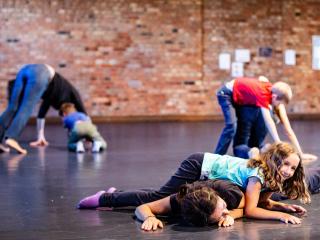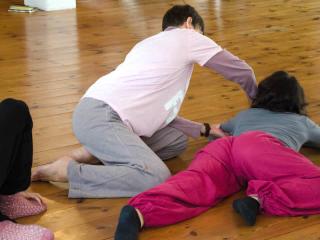
c.a.r.e - a Somatic Approach for Creativity. Attachment. Resilience. Education
Training for professionals and lifelong learners
c.a.r.e. stands for Creativity, Attachment, Resilience, and Education. Cultivating care for oneself and others forms a vital foundation for relationships—both with ourselves and those around us.
Our training program equips participants with key insights from neuroscience, pedagogy, psychology, and somatics, focusing on the core of human coexistence: human development. These principles are designed to support professionals in therapeutic, educational, and social fields, while also offering tools for personal growth.
The c.a.r.e. Approach
The c.a.r.e. Program is designed to deepen self-awareness and strengthen personal resilience—essential steps toward fostering supportive relationships with others. Rather than reliving retraumatizing memories, C.A.R.E. helps participants understand how past experiences shape the nervous system and self-perception.
Through targeted work on early childhood reflexes, embryonic development, and self-regulation, the program helps repattern dysfunctional survival strategies while building new resources for stability, flexibility and well-being. C.A.R.E. integrates innovative somatic practices with neuroscientific research, attachment theory, and developmental psychology.
Who Benefits from c.a.r.e.?
This program serves a dual purpose:
- Enhancing professional skills in resource-oriented, attachment-based support.
- Encouraging self-reflection to recognize and transform personal patterns.
By exploring the connections between movement and nonverbal interaction, C.A.R.E. empowers participants to apply these principles in both their personal and professional lives.
c.a.r.e combines insights from Body-Mind Centering®, the Feldenkrais Method and neurophysiological psychology to explore, embody and communicate the relationship between our physiological developmental processes and emotions. This connection can enrich and transform your understanding, behavior and work with others.
What is the benefit of participation?
- Understand how our physiological and emotional systems are connected.
- Learn ways to strengthen your own emotional, mental and physical well-being.
- Gain insights into how you can help others - especially children and young people - to achieve greater body awareness and emotional regulation.
Photo credit: Lorenza G. Doherty
Ausführliche Seminarinformationen
200 UE / 6 modules / 4 somatic methods / 3 instructors
Curriculum
The C.A.R.E training consists of 6 modules and each module can be booked individually. You can join the ongoing modular training at any time.
Some of the modules are recognized as educational leave in Berlin.
Curriculum
Module 1 | tba 2026 | Embryology
|
Module 2 | tba 2027 | Infant movement development
|
Module 3 | tba 2027 | Becoming Self
|
Module 4 | tba 2027 | Embodied Pathways
|
Module 5 | Jan 31 - Feb 04, 2026 | Motivation, Engagement & Vitality
|
Module 6 | Mar 30 - Apr 03, 2026 | Embodying Creation
|
For whom is C.A.R.E?
- Teachers, social workers, youth workers and parents who are looking for new ways to help children and young people grow and develop through physical experience and body awareness.
- Parents who want to better understand how they can promote their children's emotional and physical well-being through movement and mindfulness.
- Anyone who wants to learn how to find and support their own emotional and physical balance.
What are the key educational aspects of the C.A.R.E. program?
- Developmental foundations: C.A.R.E. begins with the observation of how humans develop from the earliest stages (prenatal, infancy, early childhood) and how movement and attachment influence learning. The neurobiological foundations of learning, such as the function of the nervous system and the development of trauma, form the educational cornerstones of the training.
- Learning through experience: Participants learn through embodied experience. Movement-based activities provide a deep understanding of developmental processes, while theoretical information accompanies their own learning and reflection process.
- Learning as a lifelong process: C.A.R.E. is aimed at those who wish to deepen their understanding of learning as an ongoing developmental process - be it in their work with children, adults or for their own personal growth.
Research-based and practice-oriented
Our C.A.R.E. program is based on years of practical experience and integrates proven approaches from various disciplines, such as Somatic Experiencing (SE), Body-Mind Centering®, Neuromotor Development Promotion INPP®, NARM, Feldenkrais and others. These methods are integrated with each other to promote a deep understanding of the connections between body, mind and development. They are based on the latest research and help to regulate the nervous system and understand the effects of trauma and early childhood development without focusing on the traumatic event itself.
Applied somatic methods of training
- IBMT (Integrative Bodywork- and Movement Therapy)
- Neurophysiological Psychology
- Feldenkrais
- Contact Improvisation
- Ideokinesis
- Body-Mind Centering®
- Dance
Graduation Requirements:
- Proof of 10 hours observation.
- One class presentation
- Case study or practical research, documented in an essay of maximum 3,000
General content:
Embryology- Tone
- Development of the vestibular system
- Reflexes
- Primitive reflexes
- Postural reflexes
- Human Movement Development
- Brain development
- development of the nervous system
- information processing
- physiological learning processes
- new versus re-learning
- creating a supportive space for learning
- dealing with resistance
- achievement evaluation
- age-appropriate mediation
- teenagers
- 8-11 (development of sexuality)
- 3-7/8 (Postural reflexes should be integrated)
- 0-3
- Games: Movement activities / Support / Touch
- Touch: as support not as correction /alternatives to touch
Subjects:
- Experiential Anatomy
- A variety of Somatic methods
- Context / practical application / practice fields
- Integration
- Hands on
- Case study discussions
Die Teile
Embryology
Module 1
The Origins of Experience Scientific research increasingly affirms what somatic and therapeutic traditions have long intuited: our earliest experiences — even before birth —...
Infant Movement Development
Module 2
The relevance for the human developmental process This module invites you into the rich and intricate world of early movement in infancy — a time when the body begins to...
Becoming Self
Module 3
Self - Other* and Interaction The first years of life build the foundation, on which we encounter the world, the roots of Self evolve out of relation, touch and play. In...
Embodied Pathways
Module 4
Neuroplasticity in Learning and Movement This module offers a practical and embodied exploration of the profound interconnection between movement and learning—an interplay...
Motivation, Engagement & Vitality
Module 5
Neurochemistry and Perception In this module, we explore how motivation is linked to endorphins and neurotransmitters. During the developmental process, the human brain...
Embodying Creation
Module 6
Practices of Imagination and Expression This module invites participants into a living exploration of creativity as an embodied, transformational, and practical focus. It...
Seminarleiter*innen
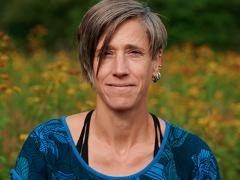
Heike Kuhlmann
www.heikekuhlmann.net
MSME, BMC®-Practitioner, dancer, -educator, choreographer, MA Performance Studies/Choreography
Heike is interested in the unfolding process of human beings. It is more than the individual unfolding, but in how people can meet each other at eye level through personal development and inclusion of structural conditions in her somatic facilitations. Being a condition to become Critical Somatics. She accompanies somatic processes in individual sessions, courses, workshops and trainings. Activism and somatics are interwoven in her artistic work. More information on: www.somatik-tanz-choreographie.de, www.heikekuhlmann.net
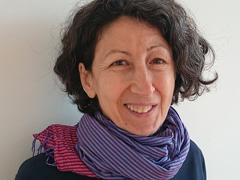
Adalisa Menghini
Teacher, choreographer, performer
Adalisa studied at the S.N.D.O in Amsterdam, after which she completed her M.A. in Neurophysiological Psychology. She is a teacher of the Feldenkrais Method. She works with professional and non-professional dancers, children and seniors. She was nominated twice as best choreographer of the "Giocabriga". In collaboration with K. Wickenhäuser, she has brought performances with school children to museums. Twice they have won the "Kinder zum Olymp!" award. She teaches at the Tanzfabrik, the Somatic Academy Berlin and at the Berlin University of the Arts.
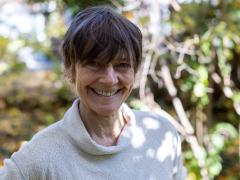
Ka Rustler
Ka Rustler has been performing, researching and analyzing somatic practices and their embodiment in movement, choreography and therapy for over 30 years. BMC® Teacher
Kosten
Costs
Professional training c.a.r.e
3680€
+ Certification 200€
Monthly installments are possible for 12 month à 330€ or 24 month à 165€. Please contact us by e-mail. >> send e-mail
Single modules - all modules can be booked seperatley as well
690€ | 5-day-module
810€ | 6-day-module
Dates
next start soon
Please don´t hesitate in contacting the team of c.a.r.e directly via e-Mail.
Curriculum
Module 1 | tba 2026 | Embryology |
Module 2 | tba 2027 | Infant movement development |
Module 3 | tba 2027 | Becoming Self |
Module 4 | tba 2027 | Embodied Pathways |
Module 5 | Jan 31 - Feb 04, 2026 | Motivation, Engagement & Vitality |
Module 6 | Mar 30 - Apr 03, 2026 | Embodying Creation |
Anmeldeinformationen
BerlinSomatische Akademie Berlin
Paul-Lincke-Ufer 30
10999 Berlin | side building
1st backyard
4th floor
- Full Price: 3680.00 EUR
Q&A
Please don´t hesitate in contacting the team of c.a.r.e directly via e-Mail.

